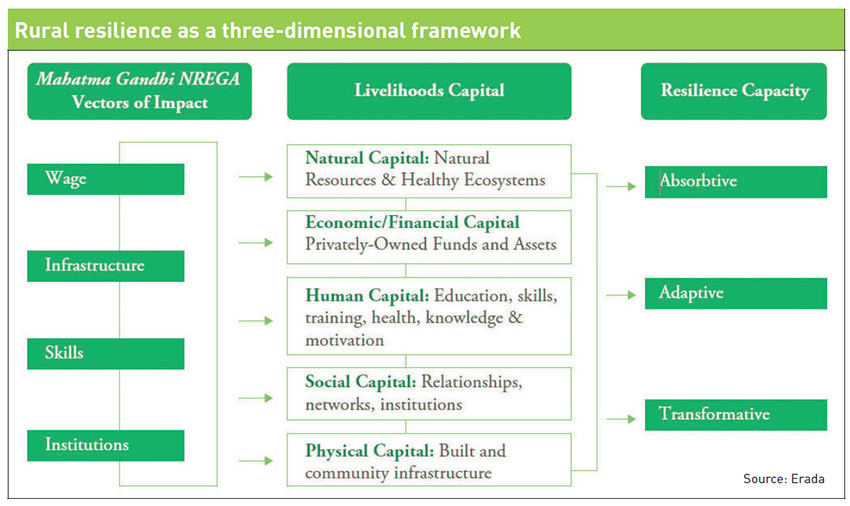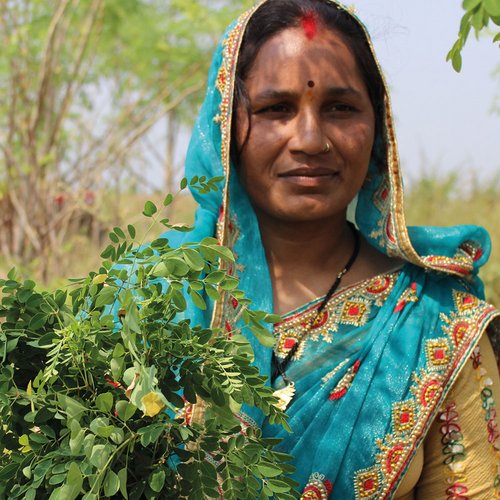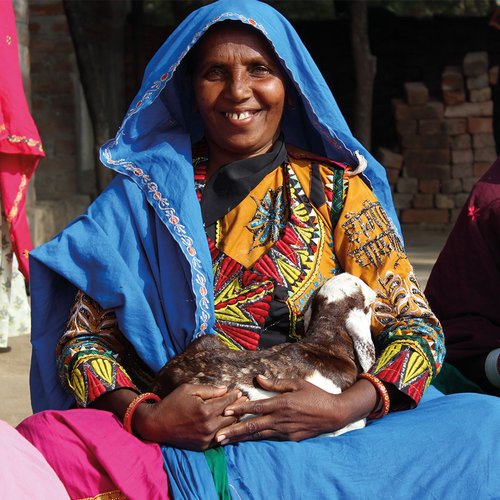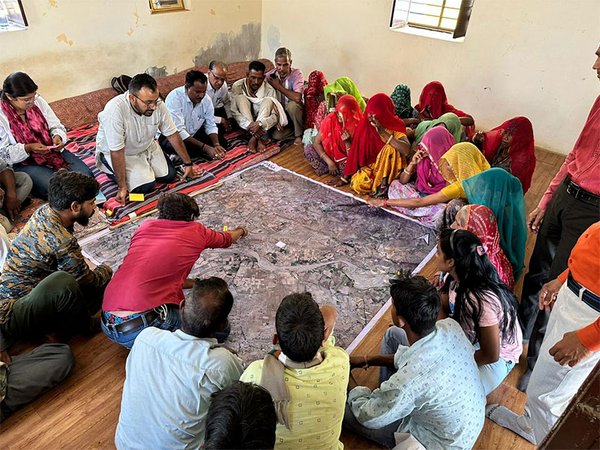 Download this article in magazine layout
Download this article in magazine layout
- Share this article
- Subscribe to our newsletter
Strengthening rural resilience in India
India, with a population of 1.4076 billion people, sees 70 per cent of its inhabitants living in rural areas. Despite constituting the majority, rural areas contribute only 46 per cent to the national income. There is a need to help rural individuals develop alternative livelihood options that would improve their income and living expense metric while helping them find a sustainable living in rural India itself.
The recent experiences of the Covid-19 pandemic, which witnessed a mass exodus of millions from cities back to their rural roots, have underscored the imperative for resilient strategies in rural development. It is within this context that the Indo-German Development Cooperation Project “Enhancing Rural Resilience through Appropriate Development Actions” (Erada) emerges as a pivotal initiative. The project aims to achieve its goal through providing for sustainable livelihood opportunities and developing alternative income options, including developing a support system that buffers exigencies and ensures success in earning improvement. These endeavours empower rural populations and maximise the utilisation of natural resources. The project also enables local communities to effectively face and withstand future challenges and become shock-proof. The project is commissioned by the German Federal Ministry for Economic Cooperation and Development (BMZ) and implemented by Deutsche Gesellschaft für Internationale Zusammenarbeit (GIZ) in cooperation with the Ministry of Rural Development (MoRD), Government of India.
The resilience framework
The project conceptualises resilience as a three-dimensional framework comprising absorptive, adaptive, and transformative components (see Figure below). Absorptive resilience involves effectively handling infrequent and low-intensity risks. It includes anticipating and taking pre-emptive actions as well as responding promptly to shocks. Adaptive resilience focuses on making minor adjustments to existing risk management strategies of households, including diversifying livelihoods based on changing conditions. Adaptive capacity aims at developing resources which include assets, economic stability, social and institutional stability, social capital and access to resources and power. Transformative resilience emphasises a system’s capacity for structural or functional changes, adopting innovative strategies to surpass vulnerability thresholds. Factors contributing to transformative resilience include governance mechanisms, policies, cultural norms, psychosocial elements and access to markets and infrastructure. The Erada project mainly concentrates on adaptive resilience and thus aims to fortify rural resilience in the face of multifaceted challenges. This capability is critical for rural populations encountering diverse shocks, be it economic fluctuations, environmental changes, or other stressors inherent to their context.

The Erada approach
To address challenges in rural resilience, the project directs its efforts towards women, youth, migrants and vulnerable communities, including tribal groups and scheduled castes. The focus spans across eight blocks (a cluster of villages and the middle tier of local government) in eight districts (administration including a cluster of blocks) of the Indian states of Rajasthan, Bihar, Madhya Pradesh, and Jharkhand, chosen specifically for their significant representation of these identified groups. All of them are also Aspirational Districts as designated by the national think tank of the Indian Government, NITI Aayog, for their lower ranks in the multidimensional poverty index among other indicators such as climate vulnerability, unemployment levels, lesser uptake of government programmes, etc. This strategic selection process ensures a comprehensive understanding of the socio-economic landscape, enabling Erada to effectively address the unique challenges in each location.
The project adopts a targeted approach by aligning its measures with the concept of local living income – the minimum monthly amount essential to adequately support a family in a specific geographic location. This metric considers various factors such as demographic profiles, food and nutrition expenses, housing costs, medical needs, transportation, and education. By formulating a living income benchmark for each observed block, the project aims to bridge the gap between this benchmark and the actual average household income. The annual living income gaps in the eight pilot blocks range from 61,585 Indian rupees (681 euros) in the Gola block of Jharkhand to 24,612 Indian rupees (272 euros) in the Bamori Block of Madhya Pradesh.
Leela Mahajan’s moringa plantations in Madhya Pradesh
Leela Mahajan with her moringa harvest. Photo: GIZ/ Ishika Ladha
Leela Mahajan and her husband initially earned 50,000 rupees (552.87 euros) annually through agriculture. Through moringa cultivation and management of moringa nurseries, Leela’s annual income increased by 45,000 rupees (498 euros) in 2023, with a projected increase to 1 lakh (1,105 euros) in the next two to three years. The support under the Erada project included awareness creation on the nutritional and market potential of moringa, developing the plantation through MGNREGA and other support programmes on one acre of her land, as well as trainings at the Krishi Vigyan Kendra (agriculture extension centre) on maintenance, bio-inputs and value addition possibilities of moringa, a certified micro-enterprise development programme by the Entrepreneurship Development Institute of India and further technical support for unlocking access to credit and market linkages.
Leela Mahajan is also the leader of the Cluster Level Federation, which includes several women SHGs in the Khalwa Block of the Khandwa District in Madhya Pradesh. She led the ’Har Ghar Moringa’ campaign (translates from Hindi to English as ’moringa tree in every household’) and motivated more than 2,000 women SHG members to undertake moringa plantations.
One pivotal tool in narrowing the income gap is the Mahatma Gandhi National Rural Employment Guarantee Act (MGNREGA), the world’s largest public work programme, benefiting nearly 150 million Indian households annually. Erada educates vulnerable communities about acquiring vital job cards for MGNREGA benefits. Concurrently, by utilising the workforce available through MGNREGA, especially on public and tribal community lands, Erada concentrates on building infrastructure for diversified livelihood activities and long-term income generation. This involves practical initiatives like constructing goat or cow sheds and plantations of local crops like Moringa (drumstick) and other fruit-bearing trees, initiating aquaculture in freshwater ponds, mushroom cultivation among landless households and minor forest produce collection for forest dependent communities, among others. Augmenting these efforts is the integration of various technologies like an Interactive Voice Response (IVR) Tool for effectively reaching women and vulnerable communities through phone calls and audio messages. Geographic Information Systems (GIS)-based thematic layers are used for land use and livelihood planning for identifying suitable works to be taken up through MGNREGA. The implementation phase involves collaboration with local Women Self Help Groups (SHGs) engaged under the National Rural Livelihood Mission programme, serving as hubs for knowledge dissemination, information distribution, capacity enhancement and financial support.
Over three years, Erada has contributed to including more than 30,000 households into the MGNREGA programme and further strengthening the livelihoods of above 14,000 households through diversified opportunities. Through these concerted efforts, the project strives to create a lasting positive impact on rural communities, promoting resilience and sustainable development.
Fagnu Bai’s goat farm in Rajasthan
Fagnu Bai with one of her goats. Photo: GIZ/ Ishika Ladha
Fagnu Bai, from the Churlikhera village in Pindwara Block of Sirohi District in Rajasthan, formerly travelled 2.5 hours to remote markets, earning 20 rupees (0.22 Euros) per package from wood and coal production. With the added challenge of managing childcare, household responsibilities, and cultivating maize once a year on her half-acre of land, her income was strained. Traditionally, most tribal households in Rajasthan maintained three to four goats for financial stability against unforeseen expenses. Erada’s intervention significantly expanded opportunities by organising and uniting households engaged in goat rearing. Through a meticulous market analysis, the initiative increased the number of goats to 10–15 per household. Participating households received crucial support, including goat sheds and fodder plantations facilitated by the MGNREGA. Clusters introduced goat weighing machines to enhance income and bargaining power, while Interactive Voice Response technology kept farmers informed about market demand and best practices. The community resource persons called ’Pashu Sakhis’ (translates from Hindi to English as ’Livestock Friend’) were capacitated to provide vaccination and deworming services to goat farmers. Fagnu Bai’s income from goats increased by 5,000 rupees (55 euros). With 35 goats and 12 bucks, she prefers goat farming over crop cultivation, planning to reinvest in and expand her venture.
This initiative positively impacted 4,934 households in the Indian states of Rajasthan, Madhya Pradesh, and Bihar states, providing an additional annual income ranging from approximately 5,000 to 8,000 rupees (55 to 88 euros) per household.
Meekha Hannah Paul is Project Manager of ERADA at GIZ India. Her work mainly focuses on social protection strategies, rural livelihoods, natural resource management and gender empowerment.
Nisha Singh is Knowledge Management Advisor at ERADA at GIZ India. She concentrates on monitoring and evaluation, communication and knowledge management in the project.
Lukas Graf was formerly an intern with GIZ India and is currently pursuing a Master of Science Degree in Climate Change Management.
Pronamika Goswami works as consultant under ERADA. She is a human-centred designer, storyteller and researcher who employs design to develop durable solutions for community problems.
Contact: meekha.hannah@giz.de




